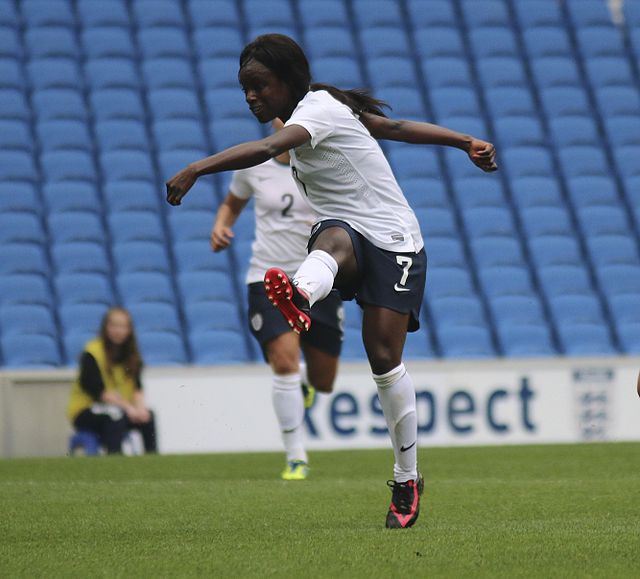England Women’s Football team won their first-ever major title in 2021. Sarina Weigman led them to a European Championship victory. However, pictures that circulated before and after the game raised the question of diversity within the team.
No player who started the final was black or a player of color. Out of a squad of 23 players, only three were black. At the 2023 FIFA Women’s World Cup in Australia and New Zealand, there were only two black players – Jess Carter and Lauren James. Why does the England women’s football team have few black players?
Become an insider. Subscribe to our newsletter for more top trending stories like this!
Finding a good soccer ball isn’t that tough. Visit Amazon and choose from a different selection of brands.
People Also Read: Will Usain Bolt’s Record Ever Be Broken?
Inaccessible Training Facilities
With the game becoming professional in England, a lot of clubs have moved their training facilities to suburban areas. This has left players who relied on facilities in the inner cities unable to train.
Most of the grounds are far away from their homes, which means they’ll need to be driven back and forth or at least use public transport. Previously, they’d walk across their houses. Due to inadequate finances in women’s football, clubs aren’t able to subsidize these services to young black players.
The Football Association had 52 centres but reduced that to 30. The Head of Women’s Technical at the FA, Kay Cossington, admits that this led to the decline of black players.
“Inclusivity was compromised as we attempted to turn more professional. We had 52 centres of excellence and we reduced them to 30 to concentrate the talent and have the best playing the best. However, in solving one problem we created another. Fewer centres meant they were less accessible,” She told shekicks.net.
People Also Read: 5 Incredible Strikers in Africa of all Seasons
Players Dropping Out
A study done by Women in Sport found that 1 million girls stop playing sports in their teenage years. Whilst this isn’t specific to football, it helps explain the low numbers of black players in the game. Keith Boanas, who has managed several clubs, admits that he found it challenging to retain girls between the ages of 14 and 16.
“I tried to get a 16-plus academy going but there’s a lack of engagement and ambition. The parents are okay but the girls don’t want to play anymore. It’s always been an issue keeping girls in their teenage years, and if you lose them from the game, you lose them for good.” Boanas shared.
Join our Spotcovery Global Black Community Facebook Group for early access to exclusive content and to share in a lively discussion.
Stereotypes
Young black footballers have to put up with stereotypes associated with being black. Some are accused of having an attitude and thus not given the opportunity to advance their careers. Speaking to the BBC, English-Nigerian footballer Adekite Fatuga-Dada shared her experience playing at the junior level.
Become an insider. Subscribe to our newsletter for more top trending stories like this!
“It’s a white space. A lot of black players that I know were told the reason why they weren’t getting picked for squads was because of things like attitude. We were kids and you couldn’t argue with the manager and defend yourself,” she told BBC Sport.
Quality soccer boots are important for your overall enjoyment of the game. Check out Amazon.
People Also Read: 5 Incredible Strikers in Africa of all Seasons
Lack of Representation
Despite the Lionesses having had some black players in the squad over the years, representation is still an issue. This, in turn, affects upcoming players who might be discouraged as they don’t have someone to look up to. Former England forward Anita Asante talked to the BBC about this.
“The lack of representation in leadership and management is a problem. People lose interest when they don’t see people who look like them.” She said.
The FA is working on a few strategies to increase the number of black players in women’s football in England. That said, it’ll take a while before that happens. Meanwhile, we hope those who already have that opportunity continue inspiring the younger players.
Are you interested in getting a Lionesses shirt? Visit Amazon.
Nearly 80% of consumers visit directories with reviews to find a local business. List your business for free in our exclusive Spotcovery Black-Owned Business Directory.
Spotcovery offers unique and fresh daily content on Black culture, lifestyle, and experiences. We talk about everything black, black people, black-owned and black-owned businesses. We also deliver authentic and relevant content that will inform, inspire, and empower you! The future of black media is critical to today’s black experience! Our primary audience includes African Americans, Africans, Afro-Caribbean, and people of African heritage. Black culture is for the culture!
Become an insider. Subscribe to our newsletter for more top trending stories like this!





